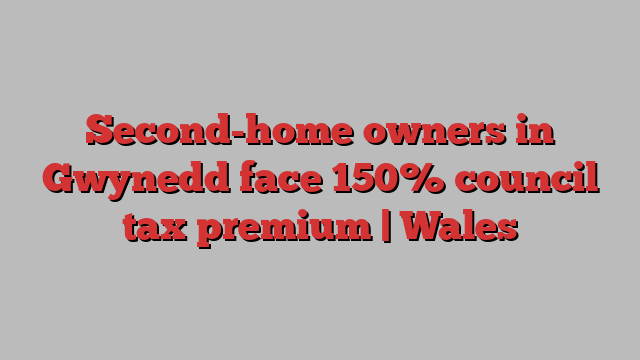
Second-home owners in north Wales face a possible 150% premium on council tax bills next year with the extra £3m raised set to be used to ease the area’s spiralling homelessness crisis.
Gwynedd council’s housing lead said it was “immoral” for people to have more than one home while other people had nowhere to live and blamed the UK and Welsh governments.
Councillor Craig ab Iago, the cabinet member for housing, said: “It is immoral that there are people with second homes when there are people who don’t have a house at all.”
He accepted that the Labour-controlled Welsh government had started to bring in measures to tackle the second-homes crisis, but said: “It isn’t enough in my opinion. We’ve been asking for help for decades and it’s only now happening.” He also blamed the UK government for creating an economic climate in which the less well-off were left “fighting over scraps”.
The council’s Plaid Cymru-controlled cabinet unanimously backed the idea of raising council tax premiums on second homes to 150% from April at a meeting in Caernarfon on Tuesday. It will ask the full council to give final approval at its meeting next week.
Cabinet members were told that there had been a 47% increase in the number of homeless people in Gwynedd over the last two years – while almost one in 10 properties in the area was a second home.
Since the financial year 2021-22, second-home owners in Gwynedd have been paying 100% council tax premiums. So, for example, a £1,000 bill for a permanent resident would turn into £2,000 for a second-home owner.
The devolved Welsh government has changed the law to allow councils to impose up to 300% premiums as part of a raft of measures designed to tackle the second-homes problem. The cabinet did not think the 300% could be justified but said the rate would be reviewed annually.
Councillor Beca Brown said: “It does stick in the throat that people have more than one house when there are so many people without anywhere to live. I welcome the idea of directing the money that could be raised from the premium towards this crisis.
“There’s hidden homelessness, people who are sleeping on sofas, people who can’t move away from home and are living in parents’ attic rooms. Each of us are just two or three problems away from being homeless. It isn’t just something that happens to someone else. It could happen to anybody.”
The leader of the council, Dyfrig Siencyn, said other places across the UK, from Pembrokeshire to North Yorkshire and Cornwall, were facing similar issues. He also flagged up the problem of Airbnbs. “It’s easy to buy a house, easy to let it. They are the people we need to target.”
So far the debate has focused on second homes in Gwynedd leading to an increase in the price of houses and flats to a level beyond the means of local residents hoping to buy. One major problem this has created is pressure on the Welsh language as speakers are priced out of heartland areas.
But this is in turn is leading to pressure on the rental market because local people who cannot afford to buy are renting – meaning that more people are being pushed into temporary accommodation such as hotels and B&Bs.